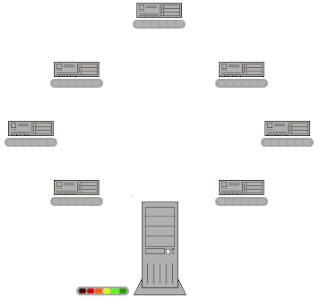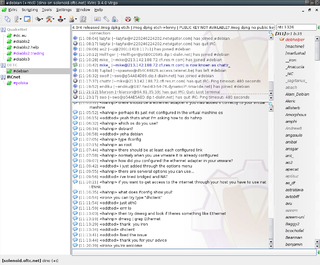 | |
| Original author(s) | Savoir-faire Linux Inc. |
|---|---|
| Stable release | |
| Preview release | |
| Repository | https://git.ring.cx/savoirfairelinux/ring-project |
| Written in | C / C++ |
| Operating system | Android, FreeBSD, iOS, iPhone, Linux, Microsoft Windows, OS X [7] |
| Platform | x86, x86-64, 32- and 64-bit ARM, powerpc, sparc, |
| Available in | English, French, German, Spanish, Russian, Chinese, Italian, Vietnamese |
| Type | VoIP, telephony, softphone, SIP |
| License | GNU General Public License 3 |
| Website | ring |
GNU Ring (formerly SFLphone) is a SIP-compatible softphone and SIP-based instant messenger for Linux, Microsoft Windows, OS X and Android. Developed and maintained by the Canadian company Savoir-faire Linux, [8] [9] and with the help of a global community of users and contributors, Ring positions itself as a potential free Skype replacement. [10]
The Session Initiation Protocol (SIP) is a signaling protocol used for initiating, maintaining, and terminating real-time sessions that include voice, video and messaging applications. SIP is used for signaling and controlling multimedia communication sessions in applications of Internet telephony for voice and video calls, in private IP telephone systems, in instant messaging over Internet Protocol (IP) networks as well as mobile phone calling over LTE (VoLTE).
A softphone is a software program for making telephone calls over the Internet using a general purpose computer rather than dedicated hardware. The softphone can be installed on a piece of equipment such as a desktop, mobile device, or other computer and allows the user to place and receive calls without requiring an actual telephone set. Often, a softphone is designed to behave like a traditional telephone, sometimes appearing as an image of a handset, with a display panel and buttons with which the user can interact. A softphone is usually used with a headset connected to the sound card of the PC or with a USB phone.

Instant messaging (IM) technology is a type of online chat that offers real-time text transmission over the Internet. A LAN messenger operates in a similar way over a local area network. Short messages are typically transmitted between two parties, when each user chooses to complete a thought and select "send". Some IM applications can use push technology to provide real-time text, which transmits messages character by character, as they are composed. More advanced instant messaging can add file transfer, clickable hyperlinks, Voice over IP, or video chat.
Ring is free and open-source software released under the GNU General Public License. In November 2016, it became part of the GNU Project. [11]

Free and open-source software (FOSS) is software that can be classified as both free software and open-source software. That is, anyone is freely licensed to use, copy, study, and change the software in any way, and the source code is openly shared so that people are encouraged to voluntarily improve the design of the software. This is in contrast to proprietary software, where the software is under restrictive copyright licensing and the source code is usually hidden from the users.

The GNU General Public License is a widely used free software license, which guarantees end users the freedom to run, study, share and modify the software. The license was originally written by Richard Stallman of the Free Software Foundation (FSF) for the GNU Project, and grants the recipients of a computer program the rights of the Free Software Definition. The GPL is a copyleft license, which means that derivative work can only be distributed under the same license terms. This is in distinction to permissive free software licenses, of which the BSD licenses and the MIT License are widely used examples. GPL was the first copyleft license for general use.

The GNU Project is a free-software, mass-collaboration project, first announced on September 27, 1983 by Richard Stallman at MIT. Its aim is to give computer users freedom and control in their use of their computers and computing devices, by collaboratively developing and providing software that is based on the following freedom rights: users are free to run the software, share it, study it and modify it. GNU software guarantees these freedom-rights legally, and is therefore free software; the use of the word "free" always being taken to refer to freedom.
Two account types are currently available, and many of each type can be configured concurrently. Both types offer similar features including messaging, video and audio. The account types are SIP and Ring. A SIP account enables the Ring softphone to connect to a standard SIP server and a Ring account can register (or use an account set up) on the decentralised Ring network which requires no central server.
By adopting distributed hash table technology (as used, for instance, within the BitTorrent network), Ring creates its own network over which it can distribute directory functions, authentication and encryption across all systems connected to it. [12]

A distributed hash table (DHT) is a class of a decentralized distributed system that provides a lookup service similar to a hash table: pairs are stored in a DHT, and any participating node can efficiently retrieve the value associated with a given key. Keys are unique identifiers which map to particular values, which in turn can be anything from addresses, to documents, to arbitrary data. Responsibility for maintaining the mapping from keys to values is distributed among the nodes, in such a way that a change in the set of participants causes a minimal amount of disruption. This allows a DHT to scale to extremely large numbers of nodes and to handle continual node arrivals, departures, and failures.

BitTorrent is a communication protocol for peer-to-peer file sharing (P2P) which is used to distribute data and electronic files over the Internet.
In cryptography, encryption is the process of encoding a message or information in such a way that only authorized parties can access it and those who are not authorized cannot. Encryption does not itself prevent interference, but denies the intelligible content to a would-be interceptor. In an encryption scheme, the intended information or message, referred to as plaintext, is encrypted using an encryption algorithm – a cipher – generating ciphertext that can be read only if decrypted. For technical reasons, an encryption scheme usually uses a pseudo-random encryption key generated by an algorithm. It is in principle possible to decrypt the message without possessing the key, but, for a well-designed encryption scheme, considerable computational resources and skills are required. An authorized recipient can easily decrypt the message with the key provided by the originator to recipients but not to unauthorized users.
Packages are available for all major Linux distributions including Debian, Fedora, and Ubuntu. [13] Separate GNOME and KDE versions are available. [14] Documentation is available on Ring's Tuleap wiki. [15]

Debian is a Unix-like operating system consisting entirely of free software. Ian Murdock started the Debian Project on August 16, 1993. Debian 0.01 was released on September 15, 1993, and the first stable version, 1.1, was released on June 17, 1996. The Debian stable branch is the most popular edition for personal computers and network servers, and is used as the basis for many other distributions.

Fedora is a Linux distribution developed by the community-supported Fedora Project and sponsored by Red Hat. Fedora contains software distributed under various free and open-source licenses and aims to be on the leading edge of such technologies. Fedora is the upstream source of the commercial Red Hat Enterprise Linux distribution.

GNOME is a free and open-source desktop environment for Unix-like operating systems. GNOME was originally an acronym for GNU Network Object Model Environment, but the acronym was dropped because it no longer reflected the vision of the GNOME project.
As of 18 December 2018, Ring was renamed Jami. [16]











